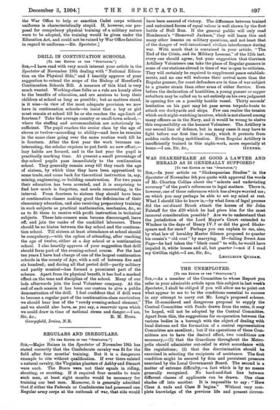Srn,—I have read with very much interest your article in
the Spectator of November 19th dealing with "National Educa- tion on the Physical Side," and I heartily approve of your suggestion to extend the scope of the Bishop of Hereford's Continuation Schools Bill. A measure of this kind is very much wanted. Working-class folks as a rule are keenly alive to the benefits of education, and are anxious to keep their children at school as long as possible ; but as matters stand, is it wise—in view of the most adequate provision we now have in continuation schools—to insist that a boy or girl must remain at school till he or she reaches the age-limit of fourteen ? Take the average country or small-town school,— where the staffing and accommodation are notoriously in- sufficient. The pupil reaches the senior class by the age of eleven or twelve—according to ability—and here he remains in the same class going over the same routine work till he is fourteen. After the first year the work becomes un- interesting, the scholar requires to put forth no new effort,— lazy habits are formed, and in the last year the pupil is practically marking time. At present a small percentage of day-school pupils pass immediately to the continuation school. They generally remain away till they reach the age of sixteen, by which time they have been apprenticed to some trade, and come back for theoretical instruction in, say, mining, engineering, or building construction. For two years their education has been arrested, and it is surprising to find how much is forgotten, and needs resurrecting, in the interval. From fourteen to sixteen they should have been at continuation classes making good the deficiencies of their elementary education, and also receiving preparatory training in such subjects as practical mathematics, mechanics, &c., so as to fit them to receive with profit instruction in technical subjects. These late-comers soon become discouraged, leave off, and join the ranks of the unskilled labourers. There should be no hiatus between the day school and the continua- tion school. Till sixteen at least attendance at school should be compulsory,—with the option of attending, after reaching the age of twelve, either at a day school or a continuation school. I also heartily approve of your suggestion that drill should form part of the evening-school course. For the last ten years I have had charge of one of the largest continuation schools in the county of Ayr, with a roll of between five and six hundred ; and during all that period drill—partly military and partly musical—has formed a prominent part of the scheme. Apart from its physical benefit, it has had a marked effect on the tone and discipline of the school. Many of our lads afterwards join the local Volunteer company. At the end of each session it has been our custom to give a public demonstration of the drill. I feel confident that if drill were to become a regular part of the continuation-class curriculum we should hear less of the "rowdy evening-school element," and we should also have, as you say, a reservoir upon which we could draw in time of national stress and danger.—I am,
Sir, &c., R. M. HOGG. Georgefield, Irvine, N.B.






































































 Previous page
Previous page